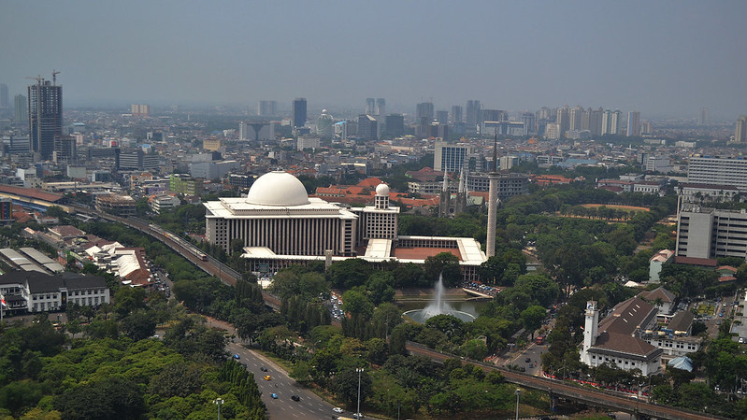Made famous by Netflix’s Wild Wild Country, the story of Osho, FKA the Bhagwan, the leader of the Rajneesh movement, has been a contentious one. In this article, Gurmeet Kaur goes back to Osho as a spiritual leader, looking at his teachings on family, sexuality, meditation, and lifestyle, to ask whether he could be a convincing trailblazer for post-colonial spirituality.

“I teach utter rebellion… if we want to change society, society is going to be offended.” — Osho
The Rajneesh movement defied dominant societal norms of the Western bloc. Osho’s teachings, rooted in Indian philosophical traditions (specifically Buddhist), challenged hegemonic ‘moral’ structures and salvation as religious expressions portrayed by non-pagan traditions, fostering renewed spiritual autonomy and global exchange. His legacy invites critical dialogue on power, resistance, and post-colonial spirituality. In this article, I present a post-colonial view on the Rajneesh movement’s ideas.
The movement was spearheaded by the enigmatic figure known as Rajneesh, or Chandra Mohan Jain, and more commonly known as Osho, an honorific term for Zen masters in Pure Land Buddhism. The movement stands as a remarkable chapter in the convergence of East-West spiritual exploration and socio-political challenges. And, as a secular spiritual leader, Rajneesh fearlessly transgressed cultural boundaries, challenging preconceived notions and entrenched ideologies.
“Osho is the most dangerous man since Jesus Christ… He’s obviously a very effective man, otherwise he wouldn’t be such a threat. He’s saying the same things that nobody else has the courage to say. A man who has all kinds of ideas, they’re not only inflammatory—they also have a resonance of truth that scares the pants off the control freaks.” — Novelist Tom Robbins
Today, for millennials and generation-z who have been found to identify strongly with spirituality, Rajneesh’s message reverberates through newer platforms like social media, enduring complex and challenging environments to reach new audiences. However, this trailblazing path did not go unchallenged back then and even now. He faced opposition from Hindus, Muslims, Christians, and secular liberals, highlighting the complex interplay between religious fundamentalism, liberal discourse, and post-colonial narratives.
Central to the Rajneesh movement was the ashram in Pune and the Rajneeshpuram ranch in Oregon, which attracted followers from around the globe, notably drawing a significant contingent from Germany.
From Osho’s own spiritual teachings, he encouraged his commune residents into provocative practices, from spontaneous naked spasms to dancing in trance-like states, challenging societal norms and encouraging the exploration of human sexuality. Like Tantric Buddhism, Osho believed that engaging in sex meditatively could lead to spiritual completeness. As I wrote in 2021, truth resides within every human body, regardless of gender, as well the essential role of women in tantric practices, acknowledging their equal importance in the world. The very idea of ‘Western and restricted Eastern morality’ regarding sex was challenged by him.
He also advocated for open marriages and communal child-rearing, emphasising collective responsibility and personal liberation. Such advocacy for open marriages and communal child-rearing was seen as a form of cultural resistance against colonial-era norms imposed on societies. By advocating for alternative family and social arrangements, he disrupts the colonial narratives that enforced rigid social norms. While rigorous critiques of harmful sexual coercion have been outlined and should be remembered, some critiques of Rajneesh’s teachings fall into what post-colonial feminists like Chandra Talpade Mohanty describe as the imposition of narrow views of gender and relationships onto non-Western contexts. Such scholars suggest that his ideas rejected Western modernity and its imposition of normative values on non-Western societies, and Eurocentric views on family and relationships.
Inside this commune, Osho’s teachings pushed boundaries — and according to The Print, Osho utilised sex and promiscuity to maintain loyalty within his cult and towards himself. They reported that “attempts to enforce sexual participation at the Pune ashram did not always stop at psychological pressure. Sometimes it allegedly extended to use of violence.”
Engaging Osho’s legacy through a post-colonial lens unveils insights into resistance against dominant Western narratives and the reclamation of spiritual autonomy. His provocative stance on pilgrimage holidays and theological institutions challenged restricted Hindu and Western-centric modes of religious expression, emphasising a dynamic, lived experience of spirituality over prescribed rituals. Similarly, Buddhist teachings emphasise personal path-making over external control, aligning with Osho’s emphasis on individual experience and liberation.
His international following and cross-cultural appeal signalled a shift towards global spiritual exchange, highlighting the historical marginalisation and misrepresentation of Eastern philosophies in Western discourse, rather than outright exclusion. While Eastern traditions were not universally marginalised, they often faced limited exposure and oversimplified portrayals. Osho’s teachings, deeply rooted in Indian traditions yet adapted for a global audience, represented a form of spiritual decolonisation, empowering individuals to redefine their paths outside hegemonic structures and foster a more inclusive dialogue across cultures.
Osho’s legacy also presents a paradox regarding individual identity and communal identity within a post-colonial context. While advocating for the dissolution of individual ego and identity through spiritual practice, he paradoxically established a commune with a distinct collective identity. This contradiction challenges us to critically reflect on the complexities of identity in decolonisation efforts.
The commune’s distinct identity may reflect an attempt to create an alternative community that transcends conventional societal norms and offers a space for collective spiritual exploration. However, it also raises questions about the potential imposition of a new collective identity, potentially mirroring the hegemonic structures Osho sought to subvert.
From a post-colonial lens, this tension underscores the challenges of navigating identity and resistance within a globalised world. It prompts us to examine how alternative movements negotiate collective identity while striving for individual liberation, highlighting the ongoing complexities of decolonisation in spiritual and communal contexts.





